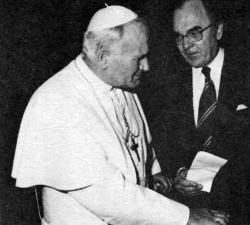| < JG 132 |
 |
JG 135 > |
Jaunā Gaita nr. 133, 1981. g. 2. numurs
JG 133
Our lead article in this issue is by Velta Rūķe-Draviņa, one of the most distinguished of exile Latvian academics. In "Latvian Folk Songs and Modern Poetry" she pays tribute to the work of folklorist Krišjānis Barons, whose collection of the dainas was a twenty-five-year labour of love. She then explores the continuing influence of these songs on Latvian poetry. Poets imitate them in meter and form, quote them and allude to them, and occasionally even weave their own lines among those of a daina to create a unique composite of the modern and the archaic. As Rūķe-Draviņa shows, the images and symbols, even much of the ideology, of this ancient Latvian poetry live on in our most recent literature.
A very large part of this issue is devoted to the Latvian exile press, a subject we began in our last issue. Tālivaldis Kiķauka's article, "Exile Periodical Publications," evaluates some fifty magazines and journals in Latvian or in other languages if they regularly contain material on Latvian history or culture, published outside Soviet Latvia. Ķiķauka bases his evaluation on each publication's readability, organization, format, typography, layout, illustrations, contents, and vitality. Twenty-one of them achieve a high level of quality. Ķiķauka concludes by calling for new ideas in every area, and for experimentation in format, typography and layout. As well, we have a number of shorter pieces on the press.
Latvian Press Association president Osvalds Akmentiņš criticizes the press for avoiding interviews, editorials, and broadly based reportage. Former Australian LPA president Aleksandrs Zariņš considers the problem of attracting young reporters and editors. He argues that they must not be discouraged because of a poor command of the language and that they must be paid for their work. Veteran journalist Olģerts Liepiņš criticizes the tacit censorship that keeps the exile Latvian public poorly informed. Eso Antons Benjāmiņš, grandson of newspaper publisher Antons Benjāmiņš, contributes a letter in English in which he recommends that the Latvian press become bilingual to attract more writers and readers. In "How the Latvian Press in Europe looks from Great Britain" English LPA president Austra Liepiņa argues that the two Latvian newspapers presently published in Europe should merge to form one that would reach a wider audience at lower cost. J. Purviņš Jurjāns' essay, "The Press and the Fate of Society," suggests that the current lack of press freedom in exile and in Soviet Latvia has its origins in control of the press during the last years of Latvian independence; this lack of freedom now prevents Latvians from intelligently planning for the future.
"Some Words about Socialism: Critical Reflections II" by Viktors Kalniņš continues our series on the future of socialism. Kalniņš sketches the sources of Marxism in the work of Adam Smith, G.E.F. Hegel, David Ricardo, Marx and Lenin and goes on to criticize it strongly on both philosophical and practical grounds.
Laimonis Mieriņš continues his yearly surveys in "Artistic Life in Latvia, 1980." He gives brief accounts of the year's most significant exhibitions and artists in architecture, photography, textiles, folk arts, ceramics, posters, graphics, sculpture, and painting. He concludes that the past year has gone by quietly, with no signs of changes in direction. Painting is particularly conservative, while textiles, ceramics, design and architecture are keeping abreast of world trends. On the whole, the decorative arts are developing in isolation from representative arts.
In the literary section we print poetry by Uldis Grasis, Maija Meirāne, Vizma Belševica, and Margita Gūtmane, and prose by Margarita Kovaļevska, Olģerts Rozītis, Erna Ķikure, and Brigita Siliņa.
The cover is by Jānis Gorsvāns.
Jānis Svilpis
 Emīls Dēliņš, editor-publisher of the newspaper Austrālijas Latvietis, in conversation with Pope John Paul II. Foto: Pontificia Fotografia Felici |